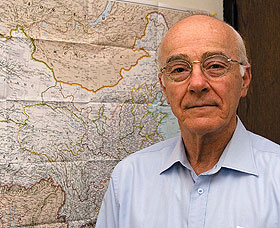  |
| HOME | THIS ISSUE | CALENDAR | GRANTS | BACK ISSUES | < BACK | NEXT > |
Economics professor reports on workers’ compensation in Chinaby Cindy Weiss - November 13, 2007 | ||||
| An emeritus faculty member in the College of Liberal Arts and Sciences who is an expert on workers’ compensation systems has reviewed the People’s Republic of China’s new workers’ compensation program and reported to the government there on how it is working. Peter Barth, professor emeritus of economics, has traveled to China five times during the past year and a half to interview central and local government figures, lawyers, employers, and union officials. He recently submitted a report that is being studied by high-level Chinese government officials. China had a small-scale workers’ compensation program until 2004, when a nationwide program began. Now workers’ compensation is administered by the government and coverage is required by law, although companies are known to evade it. Additional hazardous work accident insurance is available from private insurance companies and is supposed to be provided by employers. Barth found what he described as “two countries” – a countryside where 60 percent of the population lives and people have no workers’ compensation or work accident insurance, and urban areas where coverage is more common but where many are excluded, especially part-time, migrant workers from rural areas. He found that more than 120 million people in China now have protection under workers’ compensation, up from 85 million at the end of 2005, after the program’s first year. But as many as 700 million people are still left without it. The central government is concerned about high rates of industrial injuries and fatalities, Barth says. Government compensation and private insurance programs are managed locally, however, where the highest priority often is on production, employment, and profitability goals. The problem is akin to current product safety problems, he notes – what the central government seeks may be undermined by pressures to produce goods in a booming economy. “The central government may have a harder time implementing its goals at the local level than our federal government does,” he says. This surprised him. “It’s a single party system, and you’d think that a strong central government could get whatever they want done at the local level,” Barth says. Instead, local officials have a saying that translates loosely as, “The emperor is far away and there are many hills between here and there.” In some cases, companies may not report injuries, and workers may not be aware they are entitled to the new coverage. Migrants from rural areas often take the most hazardous jobs. If they are injured or killed, their relatives may not know where they worked, that they were injured, or that compensation is due, Barth says. Companies skirting the law may disappear and reorganize under a new name.
The whole notion of employment is different in China, Barth says. Many in the countryside work the land or work for small family enterprises. The government’s insurance provider won’t always accept certain employers, despite the new laws, and there is no insurer of last resort. When companies evade the law or are left out, he says, it “messes up your insurance system – you don’t know where the potential risks are.” In China’s legal system, contingency fees for attorneys were introduced recently and can be difficult for attorneys to collect, making redress for injuries harder to obtain through the courts. Barth’s report includes data; descriptions and analysis of the current program and best practices; and suggestions for consideration, rather than recommendations. “As a foreigner, it would seem arrogant or immodest to make recommendations based on a one-and-a-half-year study,” he says. Working with academic colleagues in five other countries and at the People’s University of Beijing, Barth collected detailed information on how workers’ compensation programs function in the U.S., Australia, Argentina, Japan, Germany, and the People’s Republic of China. He supplemented this with information he acquired on his visits to Beijing and to Chongqing, a city with more than 31 million people, and Liaoning Province in the northeast. He worked with translators, since he knows only a couple of words of Mandarin and many government officials do not speak English. Barth cautions that China’s problems with workers’ comp are no different, although larger in scope, than some of the problems still associated with the older U.S. system, which is controlled largely by state governments. Compensation programs vary widely in the U.S. and problems of evading coverage still can be found here, though on a lesser scale. China will achieve fuller coverage, but it may take a decade or more, he predicts. Barth, who retired in 2002, has written several books on workers’ compensation. Barth, a former Brookings Institution Fellow, served as executive director of the President’s commission to review the nation’s workers’ compensation laws in the early 1970s, and director of the Office of Research for the U.S. Department of Labor. In 1973, he came to UConn as head of the economics department. Barth will return to China in December, to give seminars for government officials in two cities about his report and next steps. |
| ADVANCE HOME UCONN HOME |

